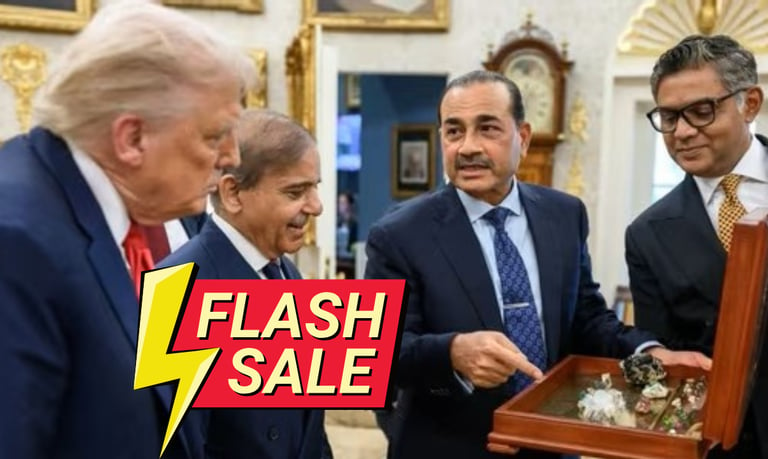Gwadar, Minerals, and Now Nukes: Pakistan is ‘On Sale’
A General Trades Its Own Country To The Highest Bidder


As a principle, nations protect their nuclear assets as symbols of sovereignty, strength, and ultimate deterrence. But in Pakistan’s case, the story has taken an alarming turn. Instead of being safeguarded for national security, the country’s nuclear arsenal now appears to be at the mercy of its military leadership—treated as a commodity for sale to the highest bidder. At the heart of it all stands one powerful figure: Pakistan’s Army Chief (self-appointing Field Martial - the de facto authority in the state, overshadowing civilian leaders and turning nuclear weapons into bargaining chips for political and financial gain.
The General Who Calls the Shots
Pakistan remains the only country in the world where the Chief of Army Staff dominates every major state decision, sidelining elected governments almost entirely. The authority of the Head of State has been reduced to no less than a beggar. Successive prime ministers have been reduced to figureheads, a reality underscored by PM Sharif bluntly admitting that “whichever country we visit, they know we are beggars and have come with a beggar’s bowl.” That humiliating characterization still defines Pakistan’s diplomacy today—only now, the “beggar’s bowl” is being traded with more dangerous offerings than before: handing over of ports on permanent basis, blind offer of exploiting natural resources, and now, providing nuclear cover to the highest bidder within a religious group of countries. The bankrupt state has become a marketplace for a general to trade, unapologetic and unchallenged.
Case Study of a Military Marketplace
Gwadar to China: Under military oversight, Pakistan effectively surrendered operational control of Gwadar Port to Beijing under the China-Pakistan Economic Corridor (CPEC), in addition to Chinese presence in Gilgit Baltistan (despite the area being a part of disputed PoK territory and defying local discontent). What was sold as development became a strategic lease of national territory, turning Pakistan into a geopolitical pawn in China’s Belt and Road ambitions.
Minerals for a Presidential Favor: Reports have surfaced of General Asim Munir dangling Pakistan’s mineral wealth before US President Donald Trump, including the bizarre idea of investing in Trump’s family’s crypto ventures. The signal was clear: even the nation’s natural assets were bargaining chips in a transactional game orchestrated by its military leadership. (By the way, the same mineral wealth is already being exploited by the Chinese in the same areas).
A Nuclear Umbrella for Saudi Arabia: The most troubling step yet is Pakistan’s defense pact with Saudi Arabia. Framing it as “mutual defense,” the deal implicitly offers Riyadh access to Pakistan’s nuclear deterrent. For a non-NPT state already outside global non-proliferation norms, this move risks triggering a nuclear domino effect. It introduces the possibility that nuclear guarantees could be extended not as statecraft but as commercial transactions and other countries are also free to cut a bargain and negotiate a deal of such kind.
Implications of a Nuclear State “On Sale”
The implications of this marketplace approach are alarming. Selling nuclear deterrence for economic gains undermines decades of global non-proliferation efforts, especially at a time when the US, EU, and Israel are working tirelessly to block Iran from acquiring nuclear weapons. For Western capitals, the Saudi-Pakistan pact complicates the argument against Tehran. How can Iran be told it must halt enrichment when another Muslim country freely trades its nuclear cachet for cash?
The danger is clear
Proliferation risks grow, sectarian divides deepen, and nuclear norms collapse when one state treats the bomb like merchandise. Instead of offering security to its people, Pakistan’s military elite appear intent on auctioning off the symbols of national survival for short-term financial favors.
A Beggar’s Bowl Strategy with Nuclear Consequences
Pakistan’s tragedy lies in the fact that its prime minister openly admits the country approaches the world with a “beggar’s bowl.” Now, with the military calling the shots, that bowl is filled not with olive branches or investment portfolios, but with nuclear leverage, port access, and resource handouts. This transactional desperation may bail out the elites of a failed state for a time, but it leaves ordinary Pakistanis impoverished, isolated, and trapped in a state where nuclear weapons offer prestige abroad but no bread at home.
The World Cannot Ignore
Nuclear Pakistan’s outreach to the Arab world offering defense pacts (along with nuclear weapons) on the basis of faith and religion is a terrifying warning of where desperation and militarization can lead. A nuclear-armed general, with strong religious doctrine, holding a beggar’s bowl, is no longer just Pakistan’s problem—it is the world’s. If unchecked, this pattern may unravel global security norms, embolden Iran, complicate Israel’s deterrence, and fracture trust with the West.
This moment calls for clarity: nuclear weapons cannot be pawned for cash, for oil, or for political favors. They are not tradable assets. The longer the international community ignores Pakistan’s transactional use of its arsenal, the closer we move toward a dangerous new age of proliferation—where nuclear bombs are no longer about deterrence, but about survival sales in the marketplace of failed states. The world must act before silence becomes complicity, and complicity becomes catastrophe for the humanity all over.
